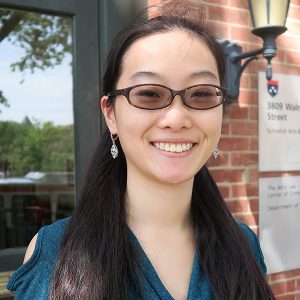Shichun (Asminet) Ling
PhD in Criminology, University of Pennsylvania ’19 (expected)
Graduate Certificate in Social, Cognitive and Affective Neuroscience, University of Pennsylvania ‘17
BA in Psychology and Social Behavior, University of California, Irvine ‘13

“The Graduate Certificate in Social, Cognitive and Affective Neuroscience (SCAN) program was one of the reasons I wanted to come to Penn,” shares Shichun (Asminet) Ling, a PhD student in criminology. Asminet is currently researching the differences in brain structure between white-collar and blue-collar criminals. She explains, “Most criminology studies seem to focus on macro-level social processes that promote criminal behavior. Individual- or group-level biological and psychological factors aren’t examined enough, especially for subtypes of crime like white-collar crimes.”
So far, her preliminary findings suggest that “in contrast to blue-collar offenders, white-collar criminals have bigger frontal lobes. Smaller frontal lobes are traditionally associated with anti-social behavior, but that’s based mostly on research using impulsive or violent offenders. White-collar criminals tend to be thought of as more calculating and better at planning, and their bigger brains could potentially help them commit more instrumental crimes.”
Though Asminet’s current research is steeped in neuroscience, she didn’t have an academic background in the subject before coming to Penn. She shares, “I worked at the University of California, Irvine’s neuropsychiatric research lab running clinical trials with mental health patients. I conducted structural and functional brain scans but didn’t fully understand what was going on or what I was seeing. Those experiences pushed me to pursue neuroscience more deeply.”
Asminet got started on her SCAN certificate in her first year at Penn. “The SCAN classes did a good job of setting me up to understand neuroscientific research,” she continues “It only requires four classes, and two of them are electives so you can tailor them to your interests. I took courses like Biosocial Criminology as well as Neuroscience, Ethics and Law.”
With hopes of continuing in academic research after completing her PhD, Asminet notes, “I study risk factors and causes of crime as well as interventions and treatments for offenders. Getting the SCAN certificate was important to me because it is relevant to my area of research and boosts my credibility when I talk about my neuroscientific projects.”